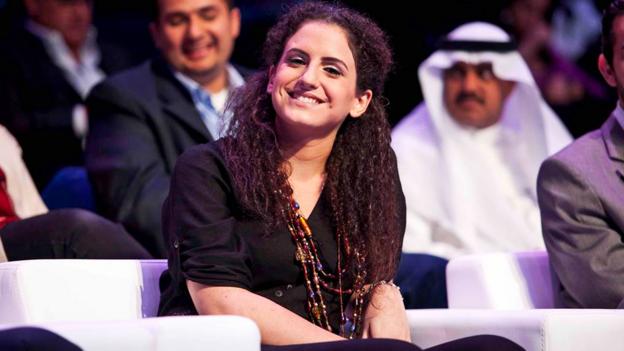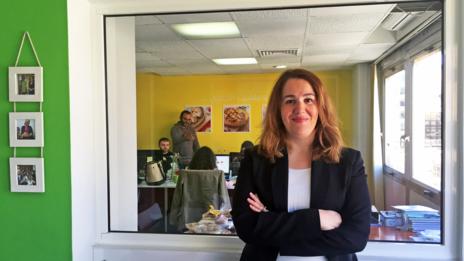Leading the way in Lebanon, one woman at a time

In the Middle East, Hind Hobeika faces the challenge of both being female and being young. (Credit: Courtesy Hind Hobeika).
Before recipe website, Shahiya, was snapped up by Japanese site, Cookpad, for $13.5m in 2014, the Beirut-based start-up had to explain itself over and over again. The mostly male investors needed to be swayed on more than just the usual.
Labaki said the fact that her two business partners are men probably went a long way towards convincing investors since men tend to be taken more seriously in the Middle East then women in business.
Shahiya is a success story for a woman-led business in the Middle East. Its user base now has 3.5 million unique visitors per month, 40% of which are from Saudi Arabia. There are 15,000 published recipes, making it the largest Arabic language digital library for recipes.
Lebanon’s relatively open society and economy mean women have had more opportunities here than elsewhere in the region. But, growing a business in the Middle East is never easy, particularly for women. Those who do succeed must meet the challenges of expanding their companies in to socially conservative countries — a step before expanding internationally — seek funding from largely male firms who are sometimes averse to dealing with women and find ways to make sure they are taken seriously by male colleagues.
Connections, rather than creativity, smarts and technical skills, can make the difference between success and failure, with networking a key ingredient to growing a business, says Dima Dabbous, Beirut-based consultant on media and gender at the United Nations Educational, Scientific and Cultural Organisation. But that can be a challenge. Even in Lebanon women are often part of a small minority at their firms and like elsewhere in the world may not be invited to casual social functions outside of work. The few women’s networking groups that exist tend to be poorly-developed and not very active, Dabbous said.
“Men already have the structure in place. Men meet outside of working hours, which automatically excludes women from deals struck outside of work. [With women] there’s too much weight put on individual effort,” said Dabbous. “I don’t think men make it on their own, so why should women do it on their own?”

Hala Labaki is a success story in the Middle East. (Credit: Courtesy Hala Labaki)
Behind the scenes
Five years ago, Hind Hobeika invented a pair of goggles that measured a swimmer’s heart rate and presented her invention on reality TV show, Stars of Science in Doha. Qatar is better known as an affluent energy state, but a fledgling IT and entrepreneur scene is now blossoming in the country. But until Hobeika won third place, the male hosts didn’t seem to want to appear on camera with her.
“[They] weren’t enthusiastic to talk to me,” she said, recalling that for most of the show the hosts preferred speaking with the male contestants on camera rather than her “It was lonely.”
In Hobeika’s case, her youthfulness also worked to her disadvantage. “People tend to take you less seriously when you’re young and a woman, especially the combination of the two,” said Hobeika, now 26.
She currently splits her time between her native Beirut and the San Francisco area in the US developing her product and business. And she’s learning the nuances of running a business in the West versus the Middle East.
“Learning to manage people has been the most difficult experience for me. I had never done it before. It was difficult to find a balance and deal with people without offending them,” she said. “In the Arab world, people aren’t used to getting feedback from someone much younger.”
Proving your worth
For Beirut-based Maya Karanouh, CEO and co-founder of branding agency, TAGbrands, the most difficult aspects of growing her business when she launched it 15 years ago had little to do with being a woman. Instead, weak infrastructure in Lebanon and generally low levels of entrepreneurship in the Middle East were her biggest challenges.
When she did expand her business into the Gulf nations, including Saudi Arabia, eight years ago, she actively took into account the cultural norms for women in these countries. She often jokes that wearing the abaya (full black covering that most Saudi women wear) made her lose her fashion sense for a few weeks.
“I’m a feminist, but I’m also a business woman. I have to navigate around regulations,” she said. For the Saudis with whom she was doing business, being a woman didn’t matter, so long as her team got the job done. That might have been because she was an outsider; however, gains in the professional realm for the Kingdom’s female citizens remain slow.
Karanouh said she does her own part to advance women in the region, making an effort to hire mothers and give them flexible working hours, acknowledging that not having a family of her own has been an advantage for her.
“Work-life balance is a major issue [here],” for employees, she said. “I’m a special case because I don’t have kids and I’m not married.”
Moral support
Lebanese entrepreneur Rana Chmaitelly launched The Little Engineer, workshops to engage young people in science, in 2009. She now has operations in Lebanon, Qatar and Libya.
She’d like to expand to the West, starting with the UK. Early on, one of her biggest challenges was getting her employees, a mix of men and women, to support her decision to grow.
“Even if you take a decision, if you’re a women, they think you’re not right. It happens all the time. Maybe it’s the culture, but we can change it,” she said in a Skype interview at an airport during a layover in Chicago.
There is still not much built-in support for women in business, but in recent years a handful of professional organisations have emerged, although they’re not yet very active.
Even so, 35% of IT entrepreneurs in the Middle East are women, compared with 10% on a global scale, according to the data analytics benchmark website Startup Compass, a sign that women in the region are making inroads in traditionally male-dominated fields here.
“Some people don’t accept change. But as an entrepreneur you can’t stagnate,” said Chmeitelly.




